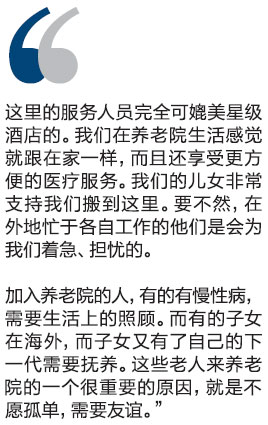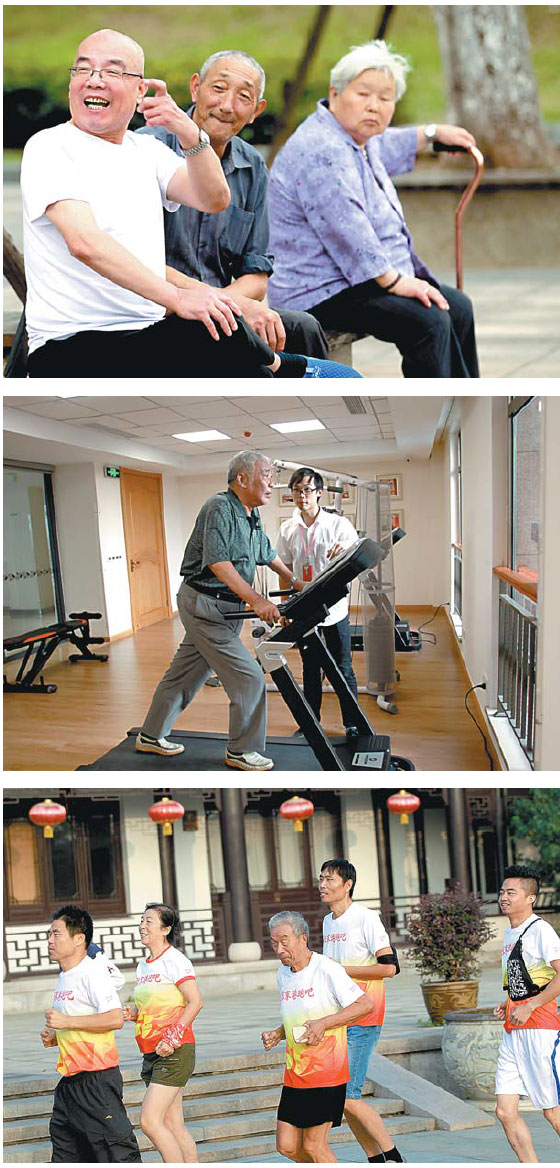Brightening up the sunset years

Taking proper care of senior citizens high on local government's agenda
U100 Pension Apartments is a home where grandma can get an ECG between rounds of onstage karaoke and dancing - bathed in laser lights, of course - and enjoy a dip in the underground pool before her ultrasound.
She can beat grandpas at snooker before getting her morning blood pressure test. And conquer a mahjong table before her cholesterol check.
| Above: Welfare and many group activities for retired people are funded by local governments and communities. |
Indeed, Zhangjiagang's private and public investments add color to the sunset years.
The city's 55,000-square-meter branch of the international chain fuses amenities afforded by a hospital and hotel with those of a neighborhood, such as a barbershop, massage parlor and supermarket.
Medical facilities are next to such social spaces as places for performing local operas.
Residents can break a sweat in an exercise room with treadmills, weight machines and Wii. For creative types, there's also a room for painting and calligraphy.
And every month, the home borrows 1,000 books from the local library on a rotating basis.
Such facilities are frequented by the occupants of 335 apartments for healthy retirees and 123 apartments for those who require assisted living because of disease or disability.
Su Meiying answers her phone in U100's canteen, where she is sipping tea while talking to a realtor about selling the two-bedroom apartment she and her husband no longer need.
"The staff is as good as any luxury hotel's," Su said.
"It's like we live in our own home. But the service is like that of a hospital."
The couple's son and daughter live in a neighboring city and are too busy to care for them.

"My son and daughter agreed to let us live here," Su said."Otherwise, they'd worry about us."
"We don't believe there's anywhere better to live. The facilities and conditions are really quite good," Su added.
That's partly because U100 Pension Apartments is part of the medical and healthcare company, Ao-yang Group. Zhangjiagang's U100's manager Ji Liuyi was previously an Aoyang Hospital doctor.
On the staff are doctors, nurses, nutritionists, physiotherapists and podiatrists.
Senior citizens' living spaces require modifications standard furniture does not offer, and the company couldn't find a source for furniture tailored for the elderly's needs.
The company hired Beijing-based architect Zhou Yanmin. The Tokyo University graduate specializes in amenities for the elderly.
"It's difficult to find such home items in China," Zhou said.
Staffers toured retirement homes in the United States, Japan and Europe in search of ideas.
There are rails in the hallways, and some wall corners are covered with protectors.
Different floors are marked with large images as well as numbers since some elderly people can become confused about the numbers but are more likely to remember they live on, say, the apple, than the second floor.
The northern residential buildings' stories are labeled with fruits and vegetables - watermelons, turnips and cabbages - while those in the south are labeled with animals - elephants, giraffes, goldfish.
The largest apartments feature convertible couches with backs that pull up for taller residents. Each has two rooms - in case couples sleep separately or for such cases as one couple around 60 who lives with the husband's father, who is in his 90s.
The mid-sized apartments' living rooms can be converted into bedrooms with a wall for couples who sleep apart.
Bathrooms are outfitted with rails and an emergency cord since the restroom is the place people - especially the elderly - are likely to fall.
Apartment doors are 1.1 meters wide in case residents need to be wheeled out without leaving bed.
U100's 50-square-meter apartments with a kitchen, bathroom and multifunction room cost 4,800 yuan a month, including basic electricity and water. The 90-sq-m rooms cost 5,600 yuan.
"The cost is affordable. We can pay for it with our pension."
Su gets about 6,000 yuan per month as a retired civil servant.
Her husband, Xu Youzhong, is diabetic and has high blood pressure. Nurses take blood tests before and after every meal.
Dieticians design nutrition regiments based on his results.
"I'm very happy eating and drinking according to the dieticians' plans," Xu said.
"Since I came here, my blood pressure, cholesterol and blood sugar have all been normal."
Residents can cook at home or dine in the restaurant or cafeteria.
Ji Liuyi, manager of U100, explains some have chronic diseases and require living assistance.
"Many others have children overseas or their kids have their own families. They come here so they're not lonely. People need friends."
That's part of the reason the retirement home employs an entertainment secretary, who produces a special schedule of activities.
But in Zhangjiagang, U100 is only part of what's making grandma's later years golden.
Social investments for farmers pay for such public facilities as the Old Companion Healthy Living Experience Home.
It's where Jinfeng town's elderly can pump iron, kill it at Fruit Ninja or croon karaoke - for free.
The agricultural township's residents who are over 60 simply need to scan their national ID cards and pass a few quick health tests, such as for blood pressure and body-mass index. Then they can create crafts and calligraphy, watch films or rest on mechanical massage beds while listening to music - all at no cost.
Such senior centers stand among the social programs the city has introduced as its GDP has soared to match that of a western province. It was 220 billion yuan ($34.6 billion) last year.
There's also a kids' playroom since many grandparents watch their grandchildren while their children work.
The home also hosts lectures to teach the elderly how to take care of themselves. Police and banks stage sessions to educate them about fraud, since many scammers prey upon senior citizens.
At 2,900 sq m, the center, which cost 20 million yuan ($3 million), is the largest of three in the town. The others are about 1,000 sq m.
More than 31,000 of Jinfeng's 120,000 residents are over 60. They enjoy most of the centers' amenities for free. The rest are heavily subsidized.
Massage chairs, for instance, cost 1 yuan for 10 minutes. Haircuts are just several yuan. Nurses will help elderly visitors shower for 3 to 5 yuan.
A laundry service washes clothes for a few yuan per article.
Much of the investment has gone into technology.
Exercise chairs log personal data such as how many repetitions a user has done and whether that number is increasing or decreasing over time.
There are various mechanized massage machines - chairs, beds and foot-reflexology devices that emulate the sensation of immersing one's feet in hot water.
The center also offers free access to iDong remote-sensor game consoles. Seniors can, for instance, hack at digital fruit with their hands - no controller necessary - or play table tennis with a paddle containing a sensor.
Those who simply want to relax can sip tea in a small rooftop courtyard called the Soul Garden.
Guests can even stay a few nights in the short-term-care area, where professionals tend to their needs when, say, their children are out of town. The facility features 30 beds that cost 20 yuan a day.
Some services for Zhangjiagang's elderly are operated by volunteers, rather than for profit or by the government.
Retired doctors Zhang Huiqin, 67, and Su Hongmei, 69, volunteer at Yonglian village's senior center in shifts every other day.
Zhang arrives at 7:30 am and takes about 30 people's blood pressure. Elderly villagers also come for health and diet consultations.
"Life's easy in the village," she said.
"And I'm still healthy. So I want to do something for the older villagers."
Visitors also play chess, table tennis and snooker. They can also borrow from the small library's on-shelf collection or access the city's online collection.
"Most young people live and work downtown," the center's director Fang Xiaping explained.
"Old people feel alone and bored at home. So we organize not only daily activities but also holiday and birthday events."
The center also coordinates volunteers to clean elderly citizens' houses weekly.
Indeed, Zhangjiagang's elderly testify that the city has invested to improve citizens' quality of life - including its finale.
(China Daily European Weekly 10/22/2015 page10)
Today's Top News
- Japan tempting fate if it interferes in the situation of Taiwan Strait
- Stable trade ties benefit China, US
- Experts advocate increasing scope of BRI to include soft power sectors
- New engine powers cargo drone expansion
- China to boost green industry cooperation
- Manufacturing PMI rises in November































